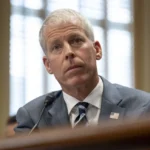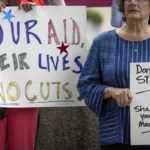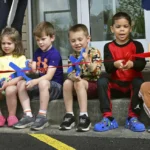Wyoming Lawmakers Should Prioritize Youth Mental Health
Expert testimony recommends accessing federal funding to meet growing need for more psychiatric residential treatment facilities
- Published In: Other News & Features
- Last Updated: Sep 28, 2022
By Cassie Craven
Special to the Wyoming Truth
The “average” 12-year-old at St. Joseph’s Children’s Home, a psychiatric residential treatment facility in Torrington, has already lived in five out-of-home placements, ranging from foster care to jail. All patients are severely and emotionally disturbed boys and girls, ranging in age from six to 12, who have survived abuse and trauma. Many of their parents are dead or in prison. When the children arrive at St. Joseph’s, all avenues have been exhausted. Currently, there are 29 patients at St. Joseph’s (17 boys and 12 girls) and a waitlist of 18, with five children expected to be admitted this week.
These children are anything but average. They are names and faces with real stories, continuing to live daily, while trying not to cut their arms because of internal pain or experience a frightening flashback to an incident of childhood incest.
As state lawmakers discussed in the Joint Labor Health and Social Services meeting in June, helping the troubled youth of Wyoming, effectively and efficiently, is a policy challenge that is not easy to solve. Staffing and facility shortages overwhelm legislative conversations, and the state cannot serve the high youth placement demand that Wyoming is experiencing.
In his testimony to the committee, Wyoming Hospital Association lobbyist Eric Boley described the financial struggles hospitals face, despite having received millions in federal COVID dollars. Boley, along with his deep bench of experts and attorneys, argued that Wyoming can access more federal money without impacting the state budget. However, many folks question the strings, carrots and sticks associated with any “free money” from the federal government. Accepting federal funds has become a conservative sticking point within Wyoming GOP politics. But according to Boley and proponents of increased federal funding allowances, this solution would help narrow the gap between cost and reimbursement with no impact on the general fund. His team later described this as a “win-win” for everyone.
St. Joseph’s offers family therapy, parent education and a fully accredited school. Eighty percent of the children at St. Joseph’s are Medicaid recipients in Wyoming; the average stay is six months. This economic indication should prompt study by the legislature. But more need help. Staffing challenges impact the ability to use all 62 beds, and there is an eight to 10-week wait time while the phone continues to ring. As the children wait to get help, they languish in hospitals or detention centers where they do not receive the psychiatric care they so desperately need to begin healing.
The state’s other psychiatric residential treatment facility is Wyoming Behavioral Institute’s Pathways Unit in Casper. This facility serves girls ages 10 to 17—70% of whom are Medicaid recipients. (As of mid-September, the Pathways census is 27, and there is a two-week waiting list that fluctuates daily due to discharges and admissions.) Like at St. Joseph’s, “most of our patients are there because of some kind of trauma,” according to Mike Philips, a representative for the facility who testified before the committee in June. “We’ve started to see more attachment problems… suicide is always a prevalent diagnosis for the children we serve,” he told lawmakers. Much of the programming is community-based, and telehealth options post-COVID are helpful, experts said. The average length of stay is less than 90 days, and most patients gain a grade level in language arts and math during their treatment.
Wyoming has only has two psychiatric residential facilities – one that is understaffed and full, another that only treats girls. This is a problematic position in a state that ranks 29.6 suicides per 100,000 people, the highest in the country, according to Beckers’ Hospital Review.
Lawmakers heard evidence that identifying at-risk children before tragedy strikes may help address the growing number who need services. This “acuity level” is more significant than it has ever been, Phillips told the committee.
Rep. Andi LeBeau (D-Fremont County) reminded the committee of the federal government’s treatment of two sovereign nations, the Eastern Shoshone and Northern Arapaho, as an example of the societal impact of ignored needs, especially for youth. She described “the historical trauma” that resulted from the government’s systematically removing and placing Native American children in boarding schools; she also noted that they were punished for dressing in their traditional attire or waving to a sibling in the hallway. LeBeau also described their progression from boarding schools into reservations and white-adoptive foster homes. “It’s Wyoming’s children,” she told the committee. “If we don’t do it [fund residential psychiatric facilities] now, they’ll be a burden on the system now or in the future”.
I believe the government should always play a limited role in our daily lives. But it is charged with protecting the most vulnerable of our society. Children who are in need of psychiatric residential treatment are undoubtedly among the neediest of us. No child should languish in a jail holding cell while awaiting a bed in a residential facility. It is cruel and unusual punishment—and, in some instances, may be a violation of our Eighth Amendment rights.
Wyoming should solve this growing crisis by immediately prioritizing youth mental health. For too long, Wyoming has been comfortable with an education system that is deplete of meaningful mental health and family services. A state-sponsored treatment facility should immediately be built, staffed and fully funded. To be frank, it’s disgusting to think of the years of debate I’ve heard on the legislative floor regarding the funding of university-related sports programs while our youth languish in jail cells that function as mental health holding facilities or end their lives. Our priorities are misaligned—and it will inevitably result in the complete loss of a generation if we don’t wake up.
Rep. LeBeau’s warning should awaken us all. The future of today’s troubled youth is in our hands. If we act now, we can operate in the land of possibilities. Or we can speak of burdens and averages with no hope for tomorrow. The choice is ours.













